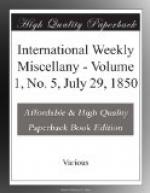Here, where our blossoms early fade and
die,
Where autumn frosts despoil
our loveliest bowers;
Where song goes up to heaven, an anguished
cry
From wounded hearts, like
perfume from crushed flowers;
Where Love despairing waits, and weeps
in vain
His Psyche to regain.
Thou cam’st not unattended on thy
way;
Spirits of beauty, grace,
and joy, and love
Were with thee, ever bearing each some
ray
Of the far home that thou
hadst left above,
And ever at thy side, upon our sight
Gleamed forth their wings
of light.
We heard their voices in the gushing song
That rose like incense from
thy burning heart;
We saw the footsteps of the shining throng
Glancing upon thy pathway
high, apart,
When in thy radiance thou didst walk the
earth,
Thou child of glorious birth.
But the way lengthened, and the song grew
sad,
Breathing such tones as find
no echo here;
Aspiring, soaring, but no longer glad,
Its mournful music fell upon
the ear;
’Twas the home-sickness of a soul
that sighs
For its own native skies.
Then he that to earth’s children
comes at last,
The angel-messenger, white-robed
and pale,
Upon thy soul his sweet oblivion cast,
And bore thee gently through
the shadowy vale,—
The fleeting years of thy brief exile
o’er,—
Home to the blissful shore.
* * * * *
MR. HEALEY is in Paris, engaged busily on his Webster and Hayne picture, of which at the time of its projection, so much was said. The canvas is some twenty feet by fourteen, and all the heads will be portraits. It will be valuable, and must command a ready sale. Will Massachusetts buy it for her State House, or South Carolina for her Capitol? It would be a splendid ornament for Fanueil Hall, and not be misplaced on the walls of the Charleston Court House.
* * * * *
MANUEL GODOY, the famous “Prince of Peace,” it is mentioned in recent foreign journals, has left Paris for Spain. The Government at Madrid has restored a considerable part of his large confiscated estates, and he probably has returned to enjoy a golden setting sun. He must be at least eighty years of age.
* * * * *
MONS. LIBRI, a well known savant, member of the Institute, and a professor of the College of France, has been charged, in Paris, with having committed extensive thefts of valuable MSS. and broken in the public libraries. He has persisted in proclaiming his innocence, and is warmly defended by certain papers. An indictment was found, he did not appear; he was tried, in his absence, for contumacy. He was found guilty of the most extensive depredations in this way. Abstracting the most valuable books, effacing identifying marks, sending them out of the country to be rebound, and then selling them at costly rates. He was sentenced to imprisonment for ten years at hard labor.




